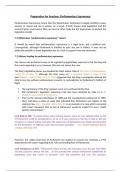Preparation for Seminar: Parliamentary Supremacy
Parliamentary Supremacy means that the Westminster Parliament is legally entitled to pass,
amend, or repeal and law it wishes. As a result, if both houses pass legislation and the
monarch gives royal assent, then no court or other body has the legal power to declare the
legislation invalid.
7.1) What does “parliamentary supremacy” mean?
It should be noted that parliamentary supremacy is a legal term, not a political one.
Consequently, although Parliament is entitled to pass any law it wishes, it may not be
politically possible to enact legislation due to a lack of support from the electorate.
7.2) History leading to parliamentary supremacy
The reason why parliament came to be regarded as legislatively supreme is that the king and
the courts regarded it as so, however, this was not always the case.
The King’s legislative power was doubted by Chief Justice Coke in The Case of Proclamations
(1611) 12 Co Rep 74, although the later cases of R v Hampden (1687) 3 State Tr 825
and Godden v Hales (1686) 11 St Tr 1166 suggested that the King’s prerogative allowed the
King to levy tax without parliamentary consent, in contradiction to Parliament’s Petition of
Right.
The supremacy of the King’s powers were very confused at this time.
But Parliament’s legislative supremacy had also been doubted by Coke CJ in Dr
Bloham’s Case (1610) 8 Co Rep 114.
Prior to the Glorious Revolution of 1688 and the constitutional settlement of 1689,
there had been a series of cases that indicated that Parliament was subject to the
common law. Day v Savadge (1614) Hob 85, is an example of a case which concurred
with Coke’s viewpoint that an Act of Parliament would be invalid if it were “made
against natural equity”.
Lord Reid at 782: “In earlier times many learned lawyers seem to have believed that an Act
of Parliament could be disregarded in so far as it was contrary to the law of God or the law
of nature or natural justice, but since the supremacy of Parliament was finally demonstrated
by the Revolution of 1688 any such idea has been obsolete.” – from British Railways Board
v Pickin [1974] AC 765
However, the notion that Acts of Parliament are subject to natural law contrasts a 1994
statement by the courts regarding their role surrounding Acts of Parliament:
Lord Templeman at 395: “Parliament makes the law, the executive carry the law into effect
and the judiciary enforce the law … In the seventeenth century Parliament established its
supremacy over the Crown as monarch, over the executive and over the judiciary.
, Parliamentary supremacy over the Crown as executive stems from the fact that Parliament
maintains in office the Prime Minister, who appoints the ministers in charge of the executive.
Parliamentary supremacy over the judiciary is only exercisable by statute. The judiciary
enforce the law against individuals, against institutions and against the executive.” – from M
v Home Office and another [1994] 1 AC 377
Parliament’s legislative supremacy really began to take hold at the time of the Glorious
Revolution, more than twenty years after the Civil War (1642-49).
The root of Parliamentary privilege today is the Bill of Rights (1689) which allowed for “… the
freedom of speech and debates or proceedings in Parliament ought not to be impeached or
questioned in any court or place out of Parliament” as per Article 9.
It can be argued, however, that since Parliament was not the democratically elected
institution that it is today that it was not the point at which our first true representative
Parliament was born.
There is not a single legal document that confers legislative supremacy onto Parliament since
no body would have the power to execute it other than by introducing a written document.
Instead, parliamentary sovereignty is rooted in the courts’ recognition that legislation that
Parliament enacts is law.
Dicey and Wade both agree that legislative supremacy of parliament was contained
within the common law.
Lord Steyn argues in his book The Concept of Law, that a “rule of recognition” is the ultimate
rule in a legal system that established the criteria for identifying whether a rule is valid or
not. The rule of recognition is binding, unlike other rules, because it is accepted by the
community, judges, and officials.
Hart argues that because the rule relies on general acceptance, it is possible that
judges might, in some instances, reject it.
Extrajudicial writing by judges such as Lord Woolf, Lord Justice Sedley, and Lord
Justice Laws has challenged the notion that Parliament can make any law
whatsoever and that the courts will respect it.
7.3) The theories behind the doctrine of parliamentary supremacy
It has been argued that Parliament’s sovereignty is the power that has been given to that
body by the people to allow it to make law so as to permit a stable form of contract. This is
because should the government no uphold their side of the contract, that a state of order
would be maintained, then the people would be politically sovereign in order to topple the
government and take back freedom. This has been theorised by Hobbes Paine, and Locke.





